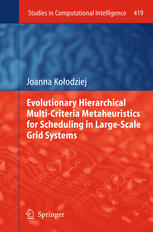

Most ebook files are in PDF format, so you can easily read them using various software such as Foxit Reader or directly on the Google Chrome browser.
Some ebook files are released by publishers in other formats such as .awz, .mobi, .epub, .fb2, etc. You may need to install specific software to read these formats on mobile/PC, such as Calibre.
Please read the tutorial at this link: https://ebookbell.com/faq
We offer FREE conversion to the popular formats you request; however, this may take some time. Therefore, right after payment, please email us, and we will try to provide the service as quickly as possible.
For some exceptional file formats or broken links (if any), please refrain from opening any disputes. Instead, email us first, and we will try to assist within a maximum of 6 hours.
EbookBell Team

0.0
0 reviewsOne of the most challenging issues in modelling today's large-scale computational systems is to effectively manage highly parametrised distributed environments such as computational grids, clouds, ad hoc networks and P2P networks. Next-generation computational grids must
provide a wide range of services and high performance computing infrastructures. Various types of information and data processed in the large-scale dynamic grid environment may be incomplete, imprecise, and fragmented, which complicates the specification of proper evaluation criteria and which affects both the availability of resources and the final collective decisions of users. The complexity of grid architectures and grid management may also contribute towards higher energy consumption. All of these issues necessitate the development of intelligent resource management techniques, which are capable of capturing all of this complexity and optimising meaningful metrics for a wide range of grid applications.
This book covers hot topics in the design, administration and management of dynamic grid environments with a special emphasis on the preferences and autonomous decisions of system users, secure access to the processed data and services, and application of green technologies. It features advanced research related to scalable genetic-based heuristic approaches to grid scheduling, whereby new scheduling criteria, such as system reliability, security, and energy consumption are incorporated into a general scheduling model. This book may be a valuable reference for students, researchers, and practitioners who work on – or who are interested in joining -- interdisciplinary research efforts in the areas of distributed and evolutionary computation.